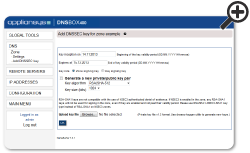ISPs, particularly those with a large business customer-base can gain competitive advantage by addressing their customers increasing concerns with online security. They are certainly at a disadvantage by not addressing them!
DNSSEC protects against Man in the Middle and cache poisoning attacks, which can result in your customers being misdirected to malicious websites and/or disrupt their services that rely on DNS such as email and VOIP. Business customers are particularly concerned about the threat of data loss and may pay a premium for improved security.
 DNSSEC uses strong public key cryptography to sign DNS data which can then be validated by a requesting server. The root DNS zone and a growing number of Top Level Domains now sign their DNS records using DNSSEC, which creates a ‘chain of trust’ to validate answers down to an individual record. Many ISPs and public DNS services, like Google DNS, can also now carry out this validation process and some governments have required their public sector agencies to implement DNSSEC – for example in the USA.
DNSSEC uses strong public key cryptography to sign DNS data which can then be validated by a requesting server. The root DNS zone and a growing number of Top Level Domains now sign their DNS records using DNSSEC, which creates a ‘chain of trust’ to validate answers down to an individual record. Many ISPs and public DNS services, like Google DNS, can also now carry out this validation process and some governments have required their public sector agencies to implement DNSSEC – for example in the USA.
But… implementing and managing DNSSEC can be complicated, costly and time-consuming:
- All your zones need to be signed for DNSSEC to be effective – a big task for large networks
- DNSSEC keys need to be stored securely so that they cannot be changed maliciously
- Keys also need to be periodically updated – known as ‘key rollover’.
- Additional DNSSEC steps in DNS resolution may introduce unwanted latency
Automate DNSSEC Key Rollover
Key rollover is particularly complex and requires very careful administration. If you get key rollover wrong, keys which are no longer valid remain cached in other DNS servers around the world or are not synchronised with your own upstream servers. In such cases, clients using DNSSEC would be unable to resolve your records.
To avoid this, you need to manage at least two sets of two types of key – a Zone Signing Key (ZSK) and a Key Signing Key (KSK), one of each live and one marked as in ‘rollover state’ – for each zone. The rollover keys need to exist for 2x their Time to Live value. With lots to know and manage, manual key rollover is incredibly error-prone.
You need a solution that, like DNSBOX:
- Automates DNSSEC key management and rollover
- Automates zone signing for rapid implementation
- Makes it easy to store DNSSEC keys securely
- Uses a high performance resolver to mitigate the extra latency of DNSSEC requests
 |
